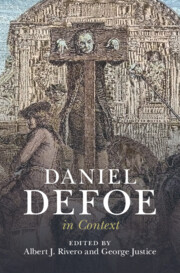Book contents
- Daniel Defoe in Context
- Daniel Defoe in Context
- Copyright page
- Contents
- Illustrations
- Notes on Contributors
- Preface
- Acknowledgements
- Chronology
- Part I Life and Works
- Part II Literary Context
- Chapter 6 Defoe and the Novel
- Chapter 7 Defoe and Popular Fiction
- Chapter 8 Verse and Verse Satire
- Chapter 9 Memories and Memorials
- Chapter 10 Periodicals, News, and Journalism
- Chapter 11 Defoe and Pornography
- Chapter 12 Defoe and Popular Religious Writing
- Chapter 13 Theatre and the Novel
- Chapter 14 The Philosophical Tradition
- Part III Authorship and Copyright
- Part IV The Monarchy and Parliament
- Part V Social Structures and Social Life
- Part VI Critical Fortunes and Literary Afterlife
- Further Reading
- Index
Chapter 6 - Defoe and the Novel
from Part II - Literary Context
Published online by Cambridge University Press: 27 April 2023
- Daniel Defoe in Context
- Daniel Defoe in Context
- Copyright page
- Contents
- Illustrations
- Notes on Contributors
- Preface
- Acknowledgements
- Chronology
- Part I Life and Works
- Part II Literary Context
- Chapter 6 Defoe and the Novel
- Chapter 7 Defoe and Popular Fiction
- Chapter 8 Verse and Verse Satire
- Chapter 9 Memories and Memorials
- Chapter 10 Periodicals, News, and Journalism
- Chapter 11 Defoe and Pornography
- Chapter 12 Defoe and Popular Religious Writing
- Chapter 13 Theatre and the Novel
- Chapter 14 The Philosophical Tradition
- Part III Authorship and Copyright
- Part IV The Monarchy and Parliament
- Part V Social Structures and Social Life
- Part VI Critical Fortunes and Literary Afterlife
- Further Reading
- Index
Summary
This chapter maps the literary terrain that Defoe’s novels entered into and considers his position in literary history as the so-called father of the English novel. While Defoe would come to be associated with the emergence of a new style of realist fiction, he draws on, combines, and exploits the audience for popular generic forms, including romances, travel and adventure tales, romans à clef, pirate chronicles, jest books, collections of anecdotes, and criminal biographies. Extending his non-fictional work, Defoe experimented with narrative strategies to capture everyday experience – an artistic aim we now associate with various forms of realism. Provocative from the start, Defoe’s novels earned detractors and defenders but were recognized as central to the English canon as early as the turn of the nineteenth century. The chapter traces Defoe’s significance to the work of both practitioners and scholars of the novel form, including Virginia Woolf and J. M. Coetzee.
- Type
- Chapter
- Information
- Daniel Defoe in Context , pp. 47 - 53Publisher: Cambridge University PressPrint publication year: 2023

